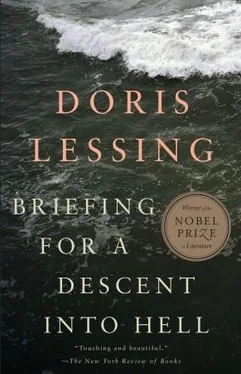These were the things you said — and more.
It is odd that I can hardly remember what you looked like as you spoke. I know I was awake enough — but even so I didn’t have enough energy to take in what you said, and to calm my own restlessness, and to watch you closely. Yet it was a night when I was prickling with energy, vitality, interest — just because I was angry (if that is the right word) at being there again . What you said explained the feeling of sameness, the againness . Yet the words you used, the energy you put into them, what you were feeling about it all — and it was what we felt too, for the young parents were stirring and awake and while they leaned forward on their chairs to look and listen, kept glancing at each other, even at people they hardly knew, to nod and smile as if to say: Yes, yes, that’s it, it is desperately true and we must not fail, we have to succeed this time … all this; the emotion or recognition in the hall was suddenly making us all alive. The sameness was gone. Our day-by-day selves were held at bay for a moment even while you said: Education means only this — that the lively alert fearless curiosity of children must be fed, must be kept alive. That is education. And, listening, we were lively and alert and fearless. Every one of us was soaked for that time with those qualities. Still stimulated, my friends and I drove back to their house. As we entered the living room, still warm and smoky from the early evening before we had left for the lecture, we began yawning. The stimulation was already gone. One of the children cried out in his sleep, and the father went up, while the mother said that she should take the child to a doctor, he was sleeping badly, was restless and had bad dreams. I understood that there was no connection at all between what was happening now — father going to soothe child, mother talking about doctor and medicines, and what these same parents had been feeling and aiming for even half an hour before, or even a few minutes before, in the car. It was all over. The time of being awake, of being receptive, of being energetic —had consumed itself. We don’t have much energy. Your words — or rather, what you had put into the words — had fed us, woken us, made us recognise parts of ourselves normally well hidden and covered over — and that was that. The evening ended as it had begun, some adults in a livingroom, talking, drinking, smoking, discussing the projected weekend school for children, but as if it were just another of their far-too-many chores and burdens.
But I was awake. I was as if stung awake. I did not sleep. And I sat by the window that night and I thought: Don’t let it go, don’t forget it. Something extraordinary did happen. Perhaps during that night while I sat looking into a suburban garden, I was like a child of three, four, five, a creature quite different from the person she was doomed to grow into. I was certainly remembering what I had been as a small child. I remembered things I had forgotten for years. Before those “prison shades” had come down. Before the trap had shut.
And when I returned home to my flat in London it stayed with me. What stayed? Not the words that you used. It was the feeling of the quality of what you said. It went with recognition, as if I had been reminded of something I knew very well. I was possessed with a low simmering fear that I would forget again, let go — what I had been as a child. It was the same feeling one has after waking from a strong dream which one knows has importance for oneself, or for a friend. You wake fighting to keep the dream, its flavour, its texture. Yet within a few minutes of waking, that country of dream has gone, its taste and reality has drained away into ordinary life. All you have left is an intellectual conviction held in a set of words. You want to remember. You try to remember. You have a set of words to offer your friend, or repeat to yourself. But the reality has gone, evaporated.
But I was remembering. It was as if, in any moment of the day that I chose to revive it, there was a bridge across from that heightened moment when you were saying things about the children, about all of us, and the pulse of the time I was in. I began consciously looking about me for that quality in other moments of life. Like testing one metal with another, ringing one substance on another apparently dissimilar. I had been stung awake by that night, and now I was restless and searching, and I was in a fever in case this restlessness might drain away like the afterglow of a useful dream and leave me tranquilly dead again.
Then, after weeks, something else happened. I’ll write it, but I can’t do more than put the words down. But it was another flash of recognition, of joy, of “yes, that’s it,” and again, this quality of matching, of ringing together, of substances being in tune, was here in this incident, exactly as it had been in those five or ten or thirty minutes when you were speaking of keeping aliveness and awakeness in children and at the same time you were feeding a whole room full of people with liveliness and wakefulness. If only for a few minutes.
I had been, as I’ve said, half unconsciously, looking, watching, trying to find that “quality” again. The quality to which I’d given the tag, “the wave-length.” For it was like suddenly touching a high tension wire. Of being, briefly, on a different, high, vibrating current, of the familiar becoming transparent. Well, and when it happened, I did not immediately recognise it, for perhaps I had already made too much of a fetish of what you had made of that moment in the lecture room — I wanted the same thing to happen. When it did happen, it was ordinary, just as it had been with you, talking about education in a routine lecture. And of course, I did not expect it just there, was halfway through the moment before I recognised it, and might even, if I had not been suddenly stung into attention, have missed it altogether.
And again, I suppose it won’t seem much when I write it. Sometimes when you read a book or story, the words are dead, you struggle to end it or put it down, your attention is distracted. Another time, with exactly the same book or story, it is full of meaning, every sentence or phrase or even word seems to vibrate with messages and ideas, reading is like being pumped full of adrenalin.
Ordinary everyday experiences can be like that.
I was walking down the street outside London University. It was a late afternoon. May I think it was; at any rate, it was not yet summer. It had been raining. Things were glistening in the street lights. Do you find too that about the time the sun goes down the world gets brighter, and more intense. And sometimes very sad. Particularly when it has been raining. Well, I’ll get on — I know that atmospheres or sights that move one person leave another cold. I had been walking briskly to keep warm; it was a typical English spring day, as cold as winter! Outside the University entrance, which I pass often enough, since I live near there, I slowed and began glancing in at the great porticoes and pillars, the formal pompousness of the place, and I was thinking that such impersonality, formality, is how one can most easily identify a place of learning — school, university, college, and that this atmosphere in itself must set a condition of thinking for a young person being educated in it. I saw a man come down those steps, but this was a time for people to be going home, and there was a steady stream of them coming across to the gates. I was looking at them idly and thinking how tinily unimportant these human beings looked beside the great cold buildings that were supposed to be their servants, and that no young thing learning there could ever believe that human beings are more important than their institutions. Words, teachers, textbooks could say one thing: the building itself shouted the opposite.
Читать дальше
Конец ознакомительного отрывка
Купить книгу










